#not a totally and easily dismissable deadbeat
Note
What are your headcanons about Marcille's mom if you have any? It's interesting that what drew Donato to her was cause she lived the history he studied, or that was said somewhere at least. She must've had an interesting life.
so this was going to be just a normal answer but then I realized I have a Lot of Things To Say. so here goes, a compilation of what we know for a fact from the canon, what I've extrapolated from the visual cues and details, and my theories based on all of that.
Things we know for a fact about Marcille's mother because they were explicitly stated in the manga and supplemental materials:
She was a court mage for a Tall-man kingdom at the southern part of the Northern Continent
Donato, a court historian, fell in love with her because she had lived through the history he was studying, and he courted her for 17 years (age 15 to 32) before getting married
She was a cheerful person who rarely showed extreme emotion and took things as they came
She always cooked a huge meal for Marcille on her birthdays
She remarried a gnome after Donato's death and a short distance away from Marcille's childhood home
Pipi, Marcille's pet bird, was actually older than Marcille and originally belonged to her mother (bird died at 62)
She was extremely heartbroken when Donato died and ultimately ended up instilling a deep fear of mortality in Marcille with her words
the only time she showed extreme emotion in front of her family was when Donato could no longer eat his favourite dish near the end of his life.
She scolded Marcille for being cruel to ants (implying she can have a stern side when needed)
Things that are explicitly shown but mostly through visual cues
She has a very distinctive style of dress always involving a ribbon choker (mirroring Marcille's habit of always wearing a matching choker with any of her outfits that don't cover her neck)
She was almost stereotypically good at housekeeping and traditionally "wifely" things (very frequently depicted wearing an apron or doing some domestic chore when not at work, seems to have been an avid cook).
She knits? (also, note the affectionate smile as she's looking at Donato and Marcille reading a book together in the full panel)
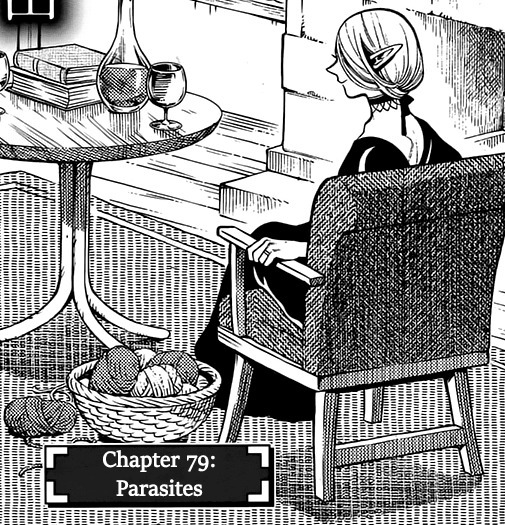
She was as excited for Marcille's milestones as Donato was.
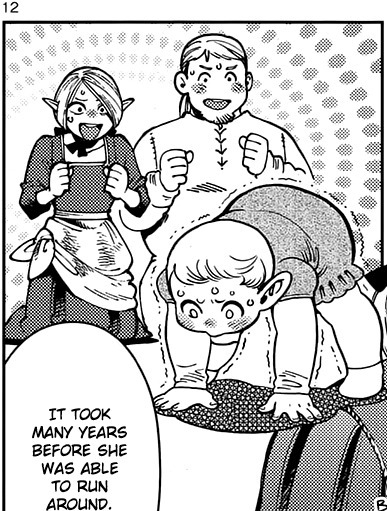
She didn't tell Marcille much about elven food
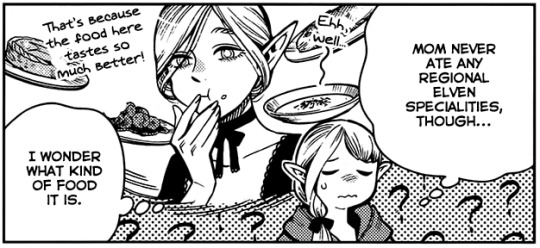
(there are a couple things that this panel in particular implies:
She lived a good deal of her life (if not being born and raised) in a mainly elven country in the West, implied by her knowing enough of an elven region's cuisine to prefer Tall-man food over it
seems to have a pretty carefree and casual demeanour overall, if this is how she replied to Marcille asking her about it (sounds like she never gave her culinary preferences that much thought to begin with)
slightly related to number 2, it seems like she and Marcille had a fairly casual parent-child dynamic (especially in comparison to the Toudens' memory of their father)
(local elf tastes Italian food once and never goes back))
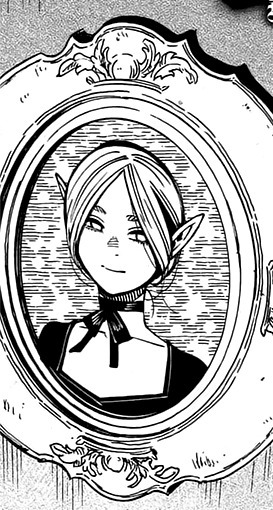
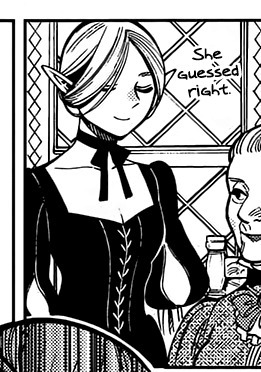
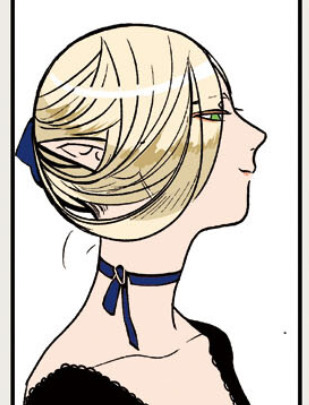
However, she seems a lot more... serious in most of the other times we see her? Almost like the very stereotypical archetype of a graceful elf.
Subsequent conclusions about her personality:
Usually pretty carefree and cheerful at home, has been a loving and attentive parent throughout Marcille's childhood (while not being so doting that she didn't discipline Marcille).
Slightly more conjectural theories on her personality:
Had a much more graceful and professional personality at work, which would explain the more serious portraits we see of her.
Given that both she and Donato had positions at the royal court, it seems a little odd that she'd go out of her way to do all the housework herself, so maybe she just enjoyed doing it?
Now taping all the evidence together and toeing the line between analysis and fanfiction:
It's clear that she loved Donato very much and was utterly devastated by losing him. But there's one thing that really stuck out to me in what little we see of her:
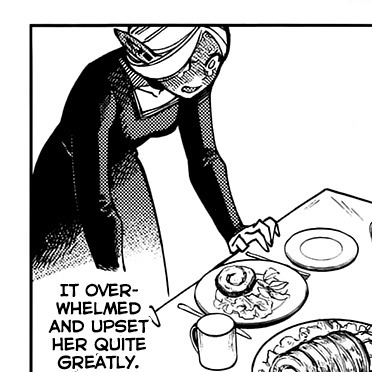
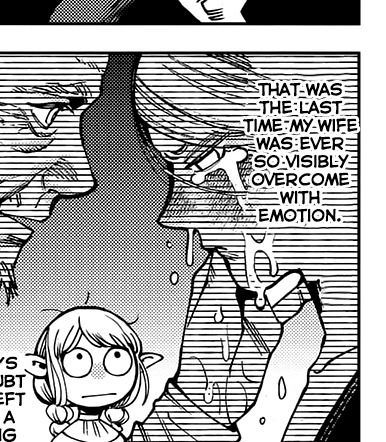
Doesn't she seem... angry? The way she's gritting her teeth, clutching the tablecloth, and how this is the first and only time we see her eyes opened that wide. In the following panel, you see her being quiet and dejected after her initial outburst. She's still crying very intensely, but her brows are furrowed, and she's not really responding to Donato's affection in her body language.
We're not told the details of how she felt about losing Donato other than that it upset her. But this, to me, implies that she was angry and resented that he was aging, that the end of his life was approaching. An "it's not fair" type of preemptive grief. And if this was the first and last time she cried like this in front of her family, she was either very good at coping in private... or very bad at letting herself feel unpleasant emotions until they become unavoidable and end up overwhelming her.
It's not too remarkable a detail on the surface. It's even reminiscent of what the audience has seen of Marcille. But... when it comes to the big picture, you'd think an elf who voluntarily chose to marry a tall-man and have a half-elf child would have been better prepared for this.
It kind of recontextualizes her cheerfulness to me.
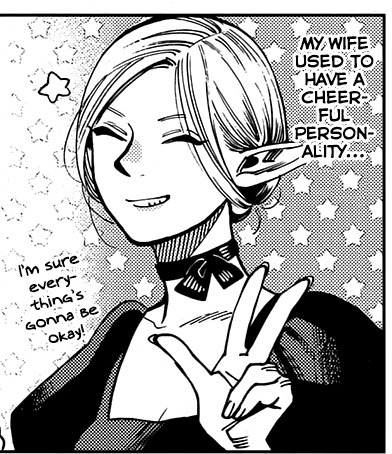
"I'm sure everything's gonna be okay!" (or some variation thereof, depending on what translation you have).
And this is stated to contrast her extreme grief when finally confronting Donato's failing body and eventual death. But I'm wondering if... maybe this optimism was why she was so upset. What if she went into all of it thinking "everything's gonna be okay"? What if she was a little young by elven standards, and just followed her heart thinking that her own resilience would get her through anything?
Of course, only to get completely overwhelmed when she actually loses Donato. She turns into a completely different person. And that's heartbreaking on its own-- but what the audience sees is the effect it had on Marcille. Can you imagine being her, watching your invincible and upbeat mother suddenly lose all the light in her eyes in one go?
I've already made a huge post about how I think Marcille models her "work persona" off her mother, but another thing that stuck with me as I was looking for more details in the manga was this:
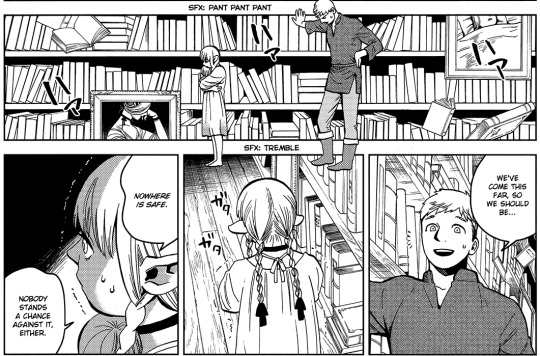
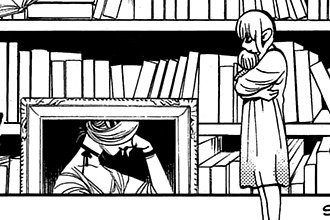
copy pasting from the other post i made about it lmao it's like... the second she resigns herself to lifelong pain and terror, there's another portrait of her mother facing her like this. with their heads bowed, in mirrored body language of resignation and despair and sorrow. Except it's posed like Marcille is still looking at her mother but her mother is looking away.
It took me a second to realize, but I think that it's a visual metaphor for the fact that Marcille's mother was the only long-lived role model she had-- and she failed to model healthy grief for her daughter. I don't say this as an accusation or to disparage her as a character, but just as a matter of fact. In her, Marcille was seeing herself older and losing a short-lived spouse or loved one of her own, and all she saw was hopelessness.
But her mother didn't mean to instill hopelessness and terror in her. She wasn't really thinking of how it would truly affect Marcille at all (at least, that's how I'm interpreting her looking down and away from Marcille in the metaphor), she was just sad. And she, in her own way, was trying to protect her daughter and help her prepare for future losses.
What she meant was "loss is inevitable, and you have to learn how to be in pain but live on anyway." What Marcille heard was "loss is inevitable, and you will be scared and hurt for the rest of your life."
Again. Marcille's mother doesn't feature explicitly in the story the way her father does -- but in so many ways, her shadow, her silhouette, her reflection is always hanging over Marcille.
All that to say... headcanon-wise (everything from here on is 100% without evidence lmao), I'd like to think that she matured and realized that she failed Marcille. I imagine her being regretful about it, wanting a chance to fix it but never finding a way to insert herself back into Marcille's life when Marcille is so so so busy becoming the most accomplished mage possible. I imagine her being herself again, now, so many years after her loss and after remarrying -- but with her cheerfulness tempered with a lot more wisdom and the pain of having gone through loss like that. I think the second Marcille actually tells her what happened in the dungeon, she'd want to go running to her daughter again -- if Marcille tells her the full truth instead of just being embarrassed she let things get that far. (oh, the tragedy of her wanting to be more like her mother and an accomplished adult who doesn't need to be babied... being embarrassed to actually tell her mother how much she fucked up...)
There's also the tension of her having remarried -- I know that there's at least a little bit of resentment that Marcille harbours about that, because she's childish like that at heart even if she makes an effort not to externalize it. I think that her mother would be aware of that, potentially adding to her sense of guilt and apprehension at trying to reappear/intrude on Marcille's life. I honestly don't think Marcille has met her stepfather -- or even considers him a stepfather rather than "mama's new husband" and kind of a total stranger. I think she and her mother actively don't talk about it in their correspondence, like an elephant in the room.
but, ultimately, I think her mother is on her side no matter what. Ancient magic? Dark necromancy? Sure, she'll feel guilty and like she was partially responsible for setting Marcille down such a painful path, but she wouldn't care. that's her daughter!! she would've moved back west and been petitioning for her at the court, buying a house right next to the Canaries barracks and visiting her every day that she wasn't on a mission. And if her husband had opinions on Marcille becoming a "dark arts user," he either gets over it or it's divorce with him. Yes, she might have had her optimism completely humbled by losing Donato like that -- but she's still headstrong and self-assured and she doesn't care what people think of her. It's her way or the highway and she's always going to be in Marcille's corner.
(She also needs a name lol. I went with Juno, just to be cute about "Marcille"s closest real life equivalent being Marcella, which is the female version of Marcellus, which in turn is a diminutive of Marcus, which was derived from Mars. Absolutely in love with Marcille potentially being named after Ares/Mars the fucking god of war btw)
#asks#she could easily be interpreted as distant or neglectful after Donato's death too#with how little involvement she has in Marcille's life/the fact that Marcille doesn't even mention her when talking about her life prospect#and that's fair! I will argue to hell and back that she was a loving parent when Donato was alive#but there's nothing that suggests she remained a loving parent afterwards#I just think that like... parental relationships are so complicated in dungeon meshi#you cannot deny that the toudens' mother loved them dearly but that she failed them both miserably as a parent#and i think it'd be more compelling if Marcille's mother was a little like that too#not a totally and easily dismissable deadbeat#but someone who truly loves her daughter but was only human herself and couldn't be what Marcille needed at a crucial moment#and regrets it deeply#and that the distance between them is mutually self-imposed by complicated feelings of guilt and fear#and a little resentment from Marcille's side that she hasn't really properly processed#I don't know if I'll ever get around to writing it but i had this idea where Marcille does finally spill the beans to her mom and she just#immediately arrives in Melini#and its awkward for a bit but they do finally have a heart to heart and air it all out#and marcille starts freaking out that her marriage is rocky rn bc her new husband wants her to distance herself from marcille#on account of the crimes and all#marcille's like no you can't blow up your marriage for me and her mother just shuts that shit down#'you didn't choose to be born. i was the one who made that choice for you'#'i brought you into this world and i'll be damned if i don't take responsibility for that the entire way'#'you are entitled to *nothing less* than my unconditional love.'#and obviously that's not a sentiment that's exactly healthy as a universal statement about parenthood#but i think its what her mother would believe and what marcille needs to hear#and dungeon meshi does such a fantastic job at just... letting imperfect things just *be* without having to justify it immediately#it expects the audience to do their own critical thinking#and know that its not trying to make sweeping universal statements in every instance#marcilleposting#marcille donato
36 notes
·
View notes
Text
Star Trek Doctors, Ranked By Crankiness
https://ift.tt/eA8V8J
This Star Trek: Lower Decks article contains spoilers for Season 2, Episode 3.
In the very first filmed episode of Star Trek: The Original Series — “The Cage” — Captain Pike drinks itty-bitty martinis with the Enterprise’s chief physician, Dr. Boyce (John Hoyt.) And although it remains to be seen if we’ll be seeing Boyce in Stranger New Worlds, the tradition of the cranky — but wise — Starfleet doctor was started right there. After Boyce and Piper, Star Trek set the standard for cranky, wise-cracking doctors in space with the introduction of Dr. Leonard “Bones” McCoy; as played by the wonderful DeForest Kelley.
While Kelley passed away in 1999, the spirit of Bones lives on. Not just in the Karl Urban version of Bones in the reboot films, but also in the foul-mouthed, utterly hilarious Catian medical officer, Dr. T’ana (Gillian Vigman) on Star Trek: Lower Decks. In the most recent episode of Lower Decks, “Mugato, Gumato,” T’ana demonstrated some next-level crankiness, as she avoided her own physical examination, something Bones had to prod Kirk to do all the time, including his first-ever filmed episode, “The Corbomite Maneuver.” But is Bones actually still the crankiest Star Trek doctor? Has T’ana dethroned him?
The only way to find out is to rank all the Trek doctors from least cranky to most cranky, and find out who is the hardest to please, and as a result, possibly the doctor we paradoxically love the most.
(Note: With some exceptions, we’ve excluded characters who were Starfleet doctors who weren’t regular recurring characters. This is why Dr. Selar from TNG isn’t on this list, even though as a Vulcan, she’s inherently cranky.)
10. Dr. Tracy Pollard (Discovery)
The least cranky doctor on this list is easily Dr. Pollard on Star Trek: Discovery. This woman even puts up with Georgiou, a dictator from an alternate universe who wants to die. As played by the fantastic Raven Daudu, it’s very possible Dr. Pollard is the best doctor on this list. She also may never be recognized as such, because she’s really even-tempered, kind and way too busy saving people’s lives to complain.
9. Dr. Phlox (Enterprise)
Phlox isn’t just one of the nicest Star Trek doctors ever, he’s actively one of the most likable characters in the entire franchise. Played charmingly by John Billingsley in all four seasons of Enterprise, Phlox projected a childlike curiosity of the universe combined with a ton of knowledge and wisdom of having seen more of the quadrant than most of the other characters. Phlox is also, perhaps, the most tolerant Star Trek doctor, insofar as he never pushes his cultural views onto others, even though, in some episodes, like “Dear, Doctor,” he’s torn apart by his own set of ethics. Oh, and he saved the life of Porthos, Captain Archer’s dog in “A Night in Skybay,” AND while doing so, managed to make a joke that Porthos would develop lizard-chameleon powers in the process. That’s bedside manner!
8. Dr. Hugh Culber (Discovery)
Who doesn’t love this guy? Since Season 1 of Discovery, Culber has put up with shit from everyone, and very rarely has he snapped. Yes, in Season 2, after coming back from the dead, he was pretty pissed off at everyone. But, as he said in Season 3, “My murderer and I are good now!” In episodes like “Su’kal” and “Die Trying,” Culber is one of the kindest and simultaneously most practical Star Trek doctors of all time. He doesn’t lie to anyone, but he does know how to make you feel better. Out of all the Discovery regulars, Culber feels cut from the same cloth as someone like Deanna Troi or Guinan. He’s smart, insightful and empathic.
7. Dr. Beverly Crusher (The Next Generation)
Crusher certainly has the ability to sass her patients, but she’s basically a nice person. Whenever Crusher freaks out on anyone it’s always because she’s either in love with a ghost that lives in a candle (“Sub Rosa”), her feelings are being manipulated by a nearby Vulcan (“Sarek”) or Jean-Luc is messing around with her emotions. (All of The Next Generation.) Crusher suffers the fools she works with, but she does it with grace and dignity. That said, you kind of know she hates certain people in certain moments, which can probably just be attributed to Gates McFadden’s flawless talent.
6. Emil, Rios’ EMH (Star Trek: Picard)
Rios has a lot of cranky holograms in Season 1 of Picard, but his medical hologram is not even close to being the most difficult of all of them. In fact, he’s pretty cordigal, and reasonable, which is odd considering the situation he’s in. Clearly, among the holograms on the La Sirena, Emil is one of the most well-adjusted. You wouldn’t want him as your primary physician in real life, and because he’s basically connected to the personality of Rios the possibility that he might become super cranky is certainly there. But, so far, he’s right on the line.
5. Dr. Julian Bashir (Deep Space Nine)
Okay, we’re crossing over into slightly cranky territory here. Bashir began his journey on DS9 as a cocky jerk, which isn’t the same as the kind of crankiness we’re talking about here. The Bones-style of crankiness is the kind of crank we can get down with. Bashir’s off-putting personality was — at first — not something anyone admired or liked. That said, as Alexander Siddig evolved the character, Bashir didn’t become more cranky, but he did develop righteous indignation. When Bashir got his indignant buzz on in episodes like “Past Tense,” or “Inter Arma Enim Silent Leges,” he was really at his best. To be clear, Bashir isn’t a nice doctor, and this is where we cross the threshold.
4. Dr. Leonard “Bones” McCoy (Star Trek: The Original Series)
Although he set the standard for crankiness, in the entire canon of Trek, Bones is somehow not the most cranky Star Trek doctor. The reasons for this are threefold: First, there are three characters on this list who are much crankiner than him. Second, Bones is actually a sweetheart deep down, and demonstrates his love for Spock over and over again, despite his terrible, terrible comments. Finally, Bones can’t be the crankiest doctor on this list because Dax heavily implied in “Trials and Tribble-ations,” that one of her previous hosts — Emony Dax — totally hooked-up with him. For some reason, this detail makes it seem like he’s a lot nicer than he comes across. And again, The Search for Spock exists.
3. Dr. Katherine Pulaski (The Next Generation)
In 1988, Pulaski would have easily been number one on this list. She mispronounces Data’s name, doesn’t feel bad about it, and proceeds to kind of make everyone else on the ship feel awful. Pulaski is a pretty good doctor, and not remotely a bad person, but she’s pretty damn cranky. The brilliant Diane Muldar plays Pulaski like someone who has been transferred to a job she doesn’t really want, which is sort of amazing considering at this point, Roddenberry didn’t want Starfleet characters to have interpersonal conflict.
In “The Icarus Factor ” (which the latest Lower Decks also referenced) Pulaski also thinks Riker’s deadbeat dad is hot and tells Riker this point blank when he’s reminding her that his dad is the worst. This alone gives her deeply strange tastes, and makes her super cranky and weird AF. Don’t mess with Pulaksi! If you talk about how your friend is mean, she might throw it in your face and say she likes them better than you anyway!
2. Dr. T’ana (Lower Decks)
Okay. So Dr. T’ana is almost the most cranky Star Trek doctor ever. Combining the best qualities of Bones, with that weird go-shove-it-vibe from Pulaksi, Gillian Vigman turns it all up to 11. It helps that T’ana is a cat-person (I.E. the Catian species) but her crankiness is more than that. She’s kind of sadistic, and isn’t afraid to use boulders to knock “strange energies” out of people when the time comes. T’ana is sort of burnt-out, but also, is kind of unflappable too. Like, you get the sense that she’s sick of all this space sickness stuff, but she’s got too much proffensionality to say she can’t do something. The secret crankiness of Dr. T’ana is that seemingly she can fix anything that is wrong with anyone. But, she’s going to make fun of them for it, and get pissed off if you look at her the wrong way.
That said, like Bones, you get the sense that none of it is personal. Which is what makes her Starfleet all the way.
1. The EMH (Voyager)
Robert Picardo’s Emergency Medical Hologram is the best cranky Star Trek doctor. There are many reasons for this. His arrogance. His constant complaining. The fact that he has good reason to complain, considering he’s a hologram that has to do other people’s bidding. But the reason that tops all other reasons is the way that Picardo can make his crankiness clear with the simple inflection of his voice. It’s not what he says. It’s how he says it. And if you need proof, all you have to do is go back to the very first Voyager episode ever, “Caretaker.” When the Doctor has to start triage on the wounded crew, he asks somebody to hand him a tricorder. He looks at it, and realizes it’s not the right kind of tricorder, and hands it back and says “medical tricorder.” The amount of venom in this comment cannot be communicated in print. The way Picardo says medical tricorder is so dismissive and frustrated, that he basically created a new level of crankiness with one single utterance.
T’ana may be creeping up the EMH from behind, but this cranky crown will be hard to swipe. Especially from a hologram.
cnx.cmd.push(function() { cnx({ playerId: "106e33c0-3911-473c-b599-b1426db57530", }).render("0270c398a82f44f49c23c16122516796"); });
Lower Decks airs new episodes on Thursdays on Paramount+.
The post Star Trek Doctors, Ranked By Crankiness appeared first on Den of Geek.
from Den of Geek https://ift.tt/3DID5RI
6 notes
·
View notes
Text
SPOTLIGHT!
(adsbygoogle = window.adsbygoogle || []).push({});
F*ck You, Your Honor
By Craig Chambers
Publisher: Black Letter Editions
Publication Date: June 2017
Genre: Literary Fiction, Satire
Synopsis:
F*ck You, Your Honor is a satirical literary novel about a low-end attorney and real estate broker who is ordered by a judge to write a book to save his law license.
Attorney Darwyn “Wyn” VanWye is down on his luck. He squats in a foreclosed government-owned HUD home and conducts his law practice over his smart phone from a sports bar.
While attempting to reconcile with Amalia, his Argentine ex-wife, so his excessive alimony payments can be terminated, Judge Solomon arbitrarily sanctions him for misconduct. Instead of a fine or jail time, the judge sentences him to write a sixty-five thousand word book about the “dignity and integrity” of the legal system. Wyn believes the judge is out to get him.
After resisting the order, F*ck You, Your Honor is the book Wyn writes to hopefully save his law license. Will he succeed in placating the judge and winning back his ex-wife?
The book is loosely inspired by an article in the Wall Street Journal about a pharmaceutical executive who was sentenced by a Federal judge to write a book to show penance for lying to the Federal Trade Commission. The executive wrote the book, but instead of writing the reflective work the judge ordered, he denounced the unfairness of the legal system.
What if a lawyer was ordered to write a book like this? His first instinct would be to try to argue his way out of it.
(adsbygoogle = window.adsbygoogle || []).push({});
Excerpt:
29
Another day, I met a new prospective client at The Overtime who wanted to retain me to file for a divorce. I was talking to Cora who was busy with the lunch crowd when the prospect arrived thirty minutes early. I hate clients who are too punctual; it shows they are controlling. It’s rude. Here am I busy working on another case, and a prospective client comes in, and I feel the pressure of her waiting for me across The Overtime. But I immediately forgave her as soon as I saw her.
I must say, if ever I was tempted to start a sexual relationship with a client, this would be the one. After the case was over, of course. I could easily see myself ridding my new client of her soon-to-be ex-husband, and, maybe months later, after enough time had passed… my thoughts wandered off for a second and then wandered back to the case. Although she was probably in her late thirties, she had aged well; beautiful lips, a sensual curved neck. She had a rich, Southern drawl.
As I introduced myself, she let out this warm vibe. I made her fill out the questionnaire while she waited. Questions about the date and history of the marriage, names and addresses, the number of children, any instances of domestic violence. All based on statutes and precedent that I would need to file her case.
I noticed by her questionnaire she lived in a prestigious area of overpriced bungalows and Tudors that surrounded a big park near downtown. The park had a lake and a boathouse. Amalia and I used to go down there some afternoons in the summers for picnics and free concerts. I think part of my attraction to her, however, subconsciously, she reminded me of Amalia.
I never really thought that I had a type. I guess I do. I never liked the competitive career women, and just as important, they never liked me.
This woman was warm and kind. She was of Spanish or Mexican origin, but unlike Amalia, she had been totally Americanized. She spoke perfect English, ate bland food at The Overtime, though she dressed flamboyantly. She worked as a branch manager in a bank. She complained about the inflated prices of real estate and the ridiculous number of Starbucks. On street corners. In grocery stores. In strip malls. Being a banker, I guess she did the math, and $6 a cup is a lot for a cup of coffee.
She confided her husband had not touched her in a year. Unbelievable! I wanted to leap out of my chair and kiss her. I hadn’t touched Amalia in over a year, either.
The first thing I did, I asked her if she and her husband could reconcile. There’s a ninety-one day waiting period for a divorce, to give the couple time to cool off, maybe go to counseling.
If the parties went through a divorce, I could make thousands of dollars. If the couple can’t get along in the divorce, and both get lawyers, a couple can blow through their life savings. If the parties reconcile, the divorce is either dismissed or never filed, and I earn, well, nothing. Amalia called this “chewing my paw.”
I thought again about my divorce. Some of the arguments with Amalia were just silly.
One time, we fought over a banana. I had left a banana on the kitchen counter the night before court to pack with my exhibit books. I usually brought a snack to help me through a whole day trial. Some judges allowed you to bring food into the courtroom to eat on the breaks; others didn’t. Without even telling me, she ate the last banana.
I have to admit, at the time, I was furious.
Another time, she packed me a lunch, put it in my briefcase, and took out my notebook with all my notes for a hearing. I appeared in court, totally unprepared. Sabotaged by Amalia. Lucky for me the case was continued. We went round and round as to who was at fault on this one.
My arguments with Amalia were passionate; never violent. They almost always ended in laughter. For a few years, we had a dog, Knuckles, though the dog eventually died. One day we took him to the vet. She wrote the dog’s name down on a form at the vet’s office: ‘Nuckles’. I informed her the word began with a silent K. The word didn’t register with her, and she had a hard time believing me. I can still hear her making the K sound, trying to pronounce it, trying to make sense of the word.
The English language mystified her. The next time she wrote out a grocery list, along with the milk and some more bananas, she asked me to pick up a package of ‘knoodles’.
I may not be the best one to give a guy marital advice, but still, here goes: Sleep with your wife from time to time. Be nice to her. Otherwise, keep your penis in your pants. These, along with financial difficulties, are the main causes of a divorce.
I explained the essence of a dissolution of marriage, showing off my knowledge with citations of statutes and case law. The first step after a divorce is filed—the parties exchange financial statements and supply the supporting documentation. I call this making the pie. Once you make the pie, you divide the pie, calculating how to fairly distribute the personal property, the assets and debts between the parties. Every asset is taken into account. From the smallest savings bond to the parties’ coin collection, each coin valued and divided coin by coin. The court will even divide the porn.
A divorce works like this: most lawyers review the financial documents, and based on the factors in the statute, calculate what their client is reasonably entitled to. Then they double it. So they will stay employed.
The most accurate definition of a divorce I copied from a well-respected, influential, and prestigious legal journal.
“A divorce is a domestic legal proceeding which takes a highly dysfunctional family, and legally divides it into two highly dysfunctional families.” That was the best definition I ever heard.
I gave her advice about the fundamentals of a divorce. There were statutes about temporary orders, how child support was calculated, parenting time was determined, alimony figured, property, pensions, and debts divided. Hopefully, there’s not much to fight about. If there are no children, thank God. That’s where people fight the most. They also fight about money, until they see how much money they will have to spend to fight about the money. First, a couple doesn’t need to agree to get a divorce. That hardly makes sense. If a couple cannot agree on who will pay the sewer bill, they cannot agree on the divorce. Second, if one party says the marriage is broken, it’s broken. End of story. Agreements of the parties or other court orders are enforced through contempt proceedings, which is an allegation of a deliberate violation of a court order under Rule 107. There are two types of contempt: punitive and remedial.
Remedial contempt is when the judge is mad enough at a party for violating a court order, he or she can put you in jail until you comply. Punitive contempt is when a judge is real mad, he or she can simply put you in jail. (Amazing, though, how a deadbeat dad who owes back child support, has no money, no job, no savings, and no prospects—through some miracle of math or accounting is able to purge a remedial contempt by coughing up ten thousand dollars after spending only one night in jail.)
The smartest thing any divorcing couple can do is sit down and work out a compromise. Settle some of the divorce or all of it ahead of getting the lawyers involved. Write it on a napkin and sign it. It doesn’t matter what form it is in.
A guy usually knows he has to share the assets of the marriage with his wife, especially if the wife is a housewife. A woman thinks differently. She doesn’t like to share. All of the assets are hers; all of the debts are his. That was the story of my divorce.
I gave my prospective client some good advice: “Empty all the bank accounts,” I suggested. “If you don’t, your husband certainly will. Once he finds out you are thinking about filing the divorce.”
This was sound legal reasoning. Before a divorce is filed, there are no court orders in place to protect the assets so the court can divide them fairly. One parent can run off with the children. Or abscond with all the assets and gamble them away in Las Vegas. Once the divorce is filed or if the money disappears in contemplation of the divorce, you will have to fully account for yourself and your finances.
(adsbygoogle = window.adsbygoogle || []).push({});
Purchase:
Amazon / B&N / Kobo / iTunes / IndieBound
Author Bio:
In his junior year in college, Craig Chambers attended the University of Leeds in England. He did not attend a single class, traveled around Europe instead. He came back and took the final exams, only to be disappointed that he got a 1 in English. He later learned that “First Honors” was the highest grade.
In the ‘80s he became a real estate broker while he worked on developing his writing style. Chambers attended law school in the ‘90’s because he observed a real estate closing where the lawyer messed up the deal, but still charged a fee of $1,000. He figured he could mess up a real estate deal for a lot less than that. His literary satire on the legal system, F*ck You, Your Honor, was released in June, 2017. He resides in Littleton, CO.
Website / Facebook / Twitter / Vimeo / BookBuzz
From one bookaholic to another, I hope I’ve helped you find your next fix.
—Dani
Have a book you’d like to suggest or one you’d like me to review? Please feel free to leave your comments down below.
#F*ck You Your Honor#F*ck You Your Honor by Craig Chambers#Craig Chambers#author Craig Chambers#author#writer#novel#publisher#Black Letter Editions#publication#June 2017#literary#literary author#literary novel#literary fiction#literary fiction author#literary fiction novel#satire#satire author#satire novel#synopsis#honor#judge#law#lawyer#attorney#real estate broker#law license#luck#foreclosed
0 notes